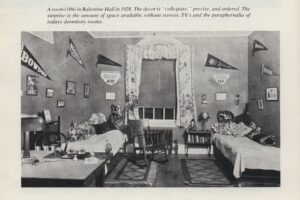Welcome to Housing Home Goods Bank, Inc. (WTH) is a nonprofit furniture bank that provides essential items to people transitioning from shelters to permanent residencies across Maine. In 2011, Volunteer Founder and Co-Chair Chris Olsen built the organization from the ground up with a group of enthusiastic volunteers.
The local community donates all basic household products, furniture and adaptive equipment. WTH occasionally uses funds raised to purchase items that are hard to get donated or for liability reasons (must be new and unused), such as child car safety seats.
Olsen has been involved in volunteerism since he was young, starting with change collections for UNICEF at Halloween. After more than 15 years in nonprofit management and earning his real estate license, Olsen decided to get back into nonprofit work and established the all-volunteer organization.
“One of the reasons behind it being all-volunteer and why I like it that way too is that we can be creative and we can adjust the way we need to. There is not a lot of formality and hierarchy. If something works, we use it. If it doesn’t work, we move on.” said Olsen. “As an all-volunteer organization, you can really find people who are in it for the right reason, and that is because we are trying to help people.”
Initially, WTH was given two storage units by Parker Bailey. The nonprofit formally began in October 2011 and expanded to help everyone in the region by the following May. Bev Uhlenhake of Epstein Commercial Properties found a 2,267-square-foot space in the back of Old Town Plaza for WTH to store inventory rent-free for four years.
Originally, WTH was a program of the Bangor Area Homeless Shelter, funded by a two-year grant. In 2011, volunteers began efforts to maintain and expand the program. The organization is now a free-standing 501(c)(3) with the IRS, incorporated in Maine. The program also expanded beyond only those moving from shelter programs to serve anyone in need, regardless of circumstances. Those displaced by a house fire or other disaster, escaping domestic violence, immigrating to Maine or people reentering society from the correctional system are offered WTH resources. The organization helps individuals (including veterans) and families, serving over 1,000 people annually.
WTH transitioned into its current house at 333 Main St Old Town in 2017. Penobscot Community Health Care (PCHC) originally owned the building. PCHC planned to expand, but instead moved into what is now the Helen Hunt Health Center, leaving the building empty for about two years. WTH was permitted to stay rent-free and later purchased the house for $25,000, using half of its $50,000 grant from the Stephen and Tabitha King Foundation. WTH is tax-exempt. The 6,500+ square foot house now has an assessed value of more than $580,000.
“We put in a heat pump system, we plumbed two bathrooms, we put in a great big utility sink, we did some work in the basement and it is now ours,” Olsen said. “One of our largest expenses is house insurance, but it’s worth it. We don’t owe rent. We do have to pay utilities, but it’s a permanent home so we don’t have to move again.”
Recently, Olsen met with E.J. Roach, the Old Town economic and community development director, about funding sources to help cover materials for porch restoration at WTH. The Mountainview Correctional Facility has a carpentry program and offered to redo the wrap-around porch and fire escape. In the coming years, Olsen hopes to one day make the building handicap accessible and include a room upstairs as space for counselors from Bangor to meet with clients in the Old Town area. He said meeting space could also be used for free classes for people starting over, helping with things like balancing a checkbook, planning a budget and even getting help with tax prep.
“Old Town has been so welcoming, and I have never really run into anybody who said no. That goes for the volunteers. We’re always looking for volunteers, but we have had so many people coming to us wanting to volunteer,” said Olsen.
According to Olsen, the formation of WTH happened on a whim. Upon turning 40, he helped raise $7,300 through multiple sources and events for the Bangor Area Homeless Shelter. Ten years later, Olsen contacted now retired Executive Dennis Marble to do more for the shelter. Marble informed Olsen that a grant that gave people moving out of the shelter a $25 gift card and help with the security deposit was running out. However, Marble explained most of them did not have a bed or items to cook with and eat off of.
“We have people who are excited about getting flatware because they have one fork, one knife, one spoon between them and their kids. I think of how much money is spent on different things like entertainment and professional sports. Nothing wrong with that, but wow, there’s a lot of money out there that could be helping people do simple things,” Olsen said.
The process of receiving goods from WTH is as follows: a caseworker or clergy member contacts the organization and works with clients to select items from the warehouse by filling out a sheet of what is taken for the client. Those using the service are encouraged to come with an advocate helping them. Agencies are asked to make arrangements for the pick up of larger items, such as mattresses or other furniture.
In terms of donations, all must satisfy the “Dignity Factor.” The purpose of free exchanges is to fill in the blanks for people in need with items that are typically taken for granted. Before donating, it is important to put yourself in the shoes of someone starting over and consider whether the contribution is still useful or too far past its prime.
To Olsen, the most rewarding aspect of his work is meeting the people that WTH serves. He also emphasized small-world stories, including, by chance, running into a volunteer from the largest furniture bank in North America on Cadillac Mountain on the anniversary of when WTH was founded.
“The other rewarding part is the small world stories,” said Olsen. “When we first started out, a lady needed an air conditioner. I took her name and number. The next day, I got a call from a UMaine student. She said, ‘I am moving to the Carolinas. I am transferring and not going to pay to ship my AC units. Would you like them for WTH?’”
The WTH volunteer steering team meets every other month and oversees activities. Opportunities to help out include picking up donations, helping at the warehouse, event planning, publicity and grant writing. There is also event volunteering at drives, such as overseeing educational displays or information booths.
Other business, community, school organizations and agencies (including those whose clients are served by WTH) are encouraged to host community events to raise awareness and funds. WTH provides pre-event publicity and promotion.
Jules Hathaway volunteered at WTH early on as it was transitioning into the new house. They shared that as someone who experienced homelessness, having resources when transitioning into a new space is important. The household items that tend to go unconsidered are often the most necessary.
“To go to a place where they have all the things that you need and where people are very encouraging and supportive, with other information about services you might need, is absolutely wonderful. I just think the world of this organization and the work that they do,” said Hathaway.
Stella Cain is a client who received aid from WTH. She escaped domestic violence with only some clothing and keepsakes before finding a place to live. Cain was able to access needed resources despite the difficult circumstances.
“From a bed and box spring to a dresser, cutlery and dishes. I was able to have it and start a whole new life. They’ve also helped several people in my life get needed items after housing insecurity,” said Cain. “I wish they were more widely known about and used! They help those in the greater community in ways that we often take for granted.”
Olsen considers gratitude to be a prevalent characteristic of WTH clients. Many people who have been helped by the organization return to volunteer their time or donate to the cause.
“The crazy thing is, the people who have the least give the most. We have had people that are homeless who will come by when we have a tabling event and they’ll put whatever change they have in the collection can,” said Olsen.
WTH assists clients of over 70 agencies and organizations and is in partnership with dozens of other community service-based programs, including Maine State Housing Authority, Penquis, Adoptive and Foster Families of Maine, The Bangor Area Homeless Shelter, Feeding Bangor Food Cupboard and Acadia Healthcare. Olsen hopes that furniture banks will one day reach the level of outreach as food pantries.
With assistance from the community, WTH can expand to serve more individuals from throughout Maine. In recent years, they reached out to and met with similar existing programs in the State with hopes of networking together and inspiring others to start programs up in other parts of Maine that are underserved by existing furniture bank programs.









